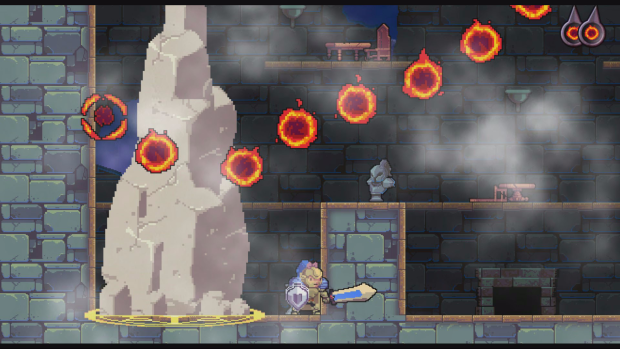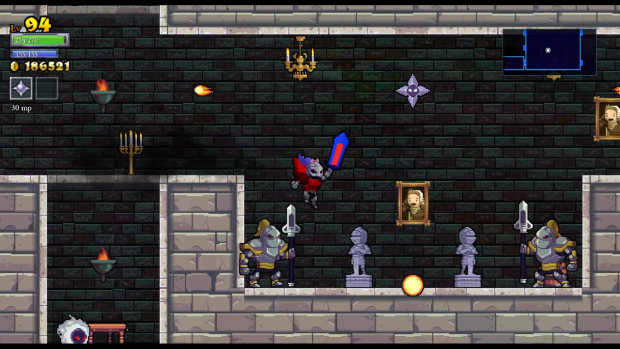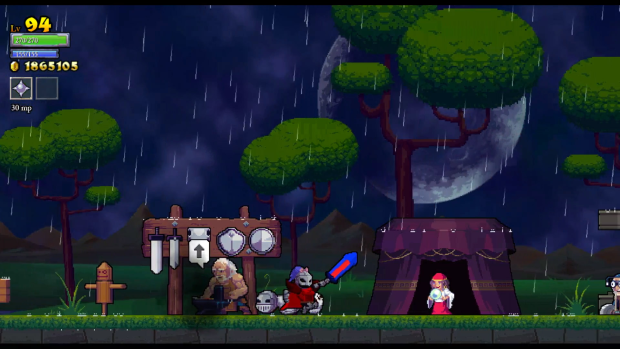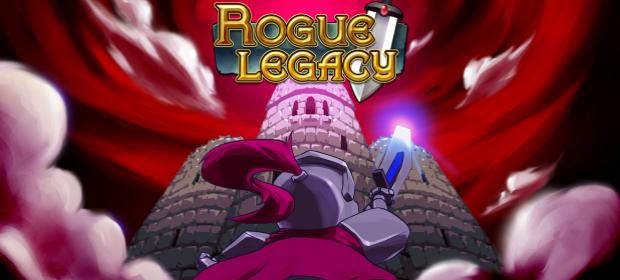Indie games coming to major consoles were unheard of until a few years ago. Microsoft took the initiative in getting some really creative and great independent games to the Xbox 360 and it really paid off. Fast forward to now and Sony is doing the same. A platform once thought of as unapproachable and closed is hosting some of the most interesting games around, second only to Steam. Transistor from Super Giant Games launched on PS4 and PC at the same time; times are changing. There is a distinct group of gamers that only plays on consoles, however, and because of this, many games go unnoticed. Rogue Legacy launched on PC over a year ago and has now made the transition to PSN-based platforms, like so many others.
Rogue Legacy was always a controller game. I didn’t much care for the keyboard controls at all on Steam, and found myself using a controller to play it. The name comes from the fact that it is has roguelike elements in the truest sense, and because bloodlines are a key mechanic. At heart, it is a difficult platformer with excellent attention to detail. The aim of the game is to explore a randomly generated castle dungeon and defeat bosses. This sounds simple and ordinary, but this is where things gets really interesting. As someone who has spent a considerable amount of time playing Spelunky, I didn’t think it would be a big deal to die a lot, but it is. You have to defeat four bosses to unlock the final boss, and each boss is in a different and unique area.

In most games, once you die, nothing carries over. But Rogue Legacy builds on your legacy. Once you die, your descendants that have unique traits carry forth. These traits range from colour-blindness (making everything monochrome), far-sightedness (where a small area around your character is blurred), all the way to OCD, where you recover MP by basically trying to swipe at everything and more. The implementation is great and there is a bit of humour thrown in for every descendant, and each one also looks noticeably different. When you die, you see parting words from your character and are taken to the main menu. The only things that carry over are gold and the various upgrades you have unlocked.
Jumping, slashing with your sword, and magic skills are your main abilities. More unlock as your collect additional gold from within the dungeon. There are quite a few things to look out for in addition to basically not dying while exploring areas. You find blueprints that can be used to create new equipment by the blacksmith, and runes found in fairy chests unlock more abilities. Once you have enough gold to unlock the architect, he can lock the castle so you can continue playing the same dungeon over and over to finally have a chance at defeating the bosses. Gold found within the dungeon by hitting furniture and opening chests (among other things) is supremely important. This gold can be used to upgrade your own class, weapons, armour, and to unlock a plethora of new mechanics. There are also random health and mana drops from furniture and other items you slash with your sword. Your descendant will only be allowed to enter the castle after surrendering all gold to the gatekeeper, so spending as much as possible on upgrades is preferred.

The enemy design in Rogue Legacy is annoyingly good. Enemies often feel way too overpowered at first because of the sheer variety you encounter as you traverse the dungeon. Each type of enemy has unique skills, and some are just there to kill you and make you want to fling your controller at the screen. There’s a reason the difficulty is compared to the Souls series. The best part about the different enemy types is how your unique descendant character traits change the mechanics to some extent. There is also a training dummy before you enter the castle that you can use to see how much damage you do. Striking it will reward you with some funny dialogue, including “Do you even lift?”.
Rogue Legacy excels in the audio department, too. The soundtrack is great and it draws influences from early Final Fantasy games for boss battle music. Along with audio cues, visual icons are really important to tell which enemy is approaching or in the next area. The visuals of the game are not on par with the audio and overall design, but they’re serviceable.

VERDICT: Rogue Legacy is full of surprises. When you’re not attempting to kill a difficult boss, you’ll find yourself trying to solve a platforming puzzle to unlock a special chest, discovering seemingly hidden or unexplored areas, and more. The game is incredibly hard at first, but it rewards perseverance. Even with the old school design, Rogue Legacy is filled with a sense of discovery that helps make it so great. This is something that I will be playing for a long time, and you should too – it is that damn good.

SUPERB. This is the mark of greatness, only awarded to games that engage us from start to finish. Titles that score 9/10 will have very few problems or negative issues, and will deliver high quality and value for money across all aspects of their design.
Review code provided by publisher.





